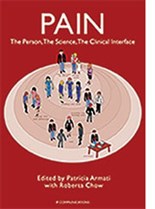Pain: The person, the science, the clinical interface
Edited by Patricia Armati with Roberta Chow
Research: IP Communications, 2015
ISBN: 978-0-9872905-6-4

When a book on such an important and challenging area starts with the words, ‘General practice is, in the main, the front line of pain management’, you know exactly who the target audience is. This refreshing acknowledgment of the central place general practitioners (GPs) have in this critical clinical area drives the content and usefulness of this comprehensive approach to pain management. The editors really understand general practice. Always based on a foundation of patient-centred care, this collection of expert authors detail the contemporary science and evidence that informs what is, perhaps, one of the most important aspects of work for our patients: the clinical management of pain.
Our understanding of pain, including its pathophysiology, assessment, diversity and management, has undergone a rapid evolution in the past few decades. For these reasons, a comprehensive overview is welcome, especially one that acknowledges the key role of primary care. While the book covers the evidence base very clearly, the clinical focus and application of this knowledge is always paramount.
The chapters on best practice assessment and management of a wide variety of common clinical presentations (eg acute pain, chronic pain, postoperative pain, migraine, headache, cancer pain, pain in children, among others) would be enough to justify getting this book. I was surprised, however, at how much I enjoyed learning more about the science of pain. So much important work has been done in this area and I now have a much better understanding of the implications of these advances, especially for therapeutics and other management modalities, which are also well covered in this book. The evidence is well referenced and the chapters provide links to a wealth of useful resources. The authors have also provided a handy website link where these resources will be continuously updated.
Comprehensive and well-written manuals on central general practice management areas are always welcome. Pain: The person, the science, the clinical interface offers a contemporary, evidence-based, one-stop shop for the assessment and management of pain in all its facets in the general practice setting. An exemplary contribution to the canon.
Dr Ronald McCoy
Education Strategy Senior Advisor, RACGP